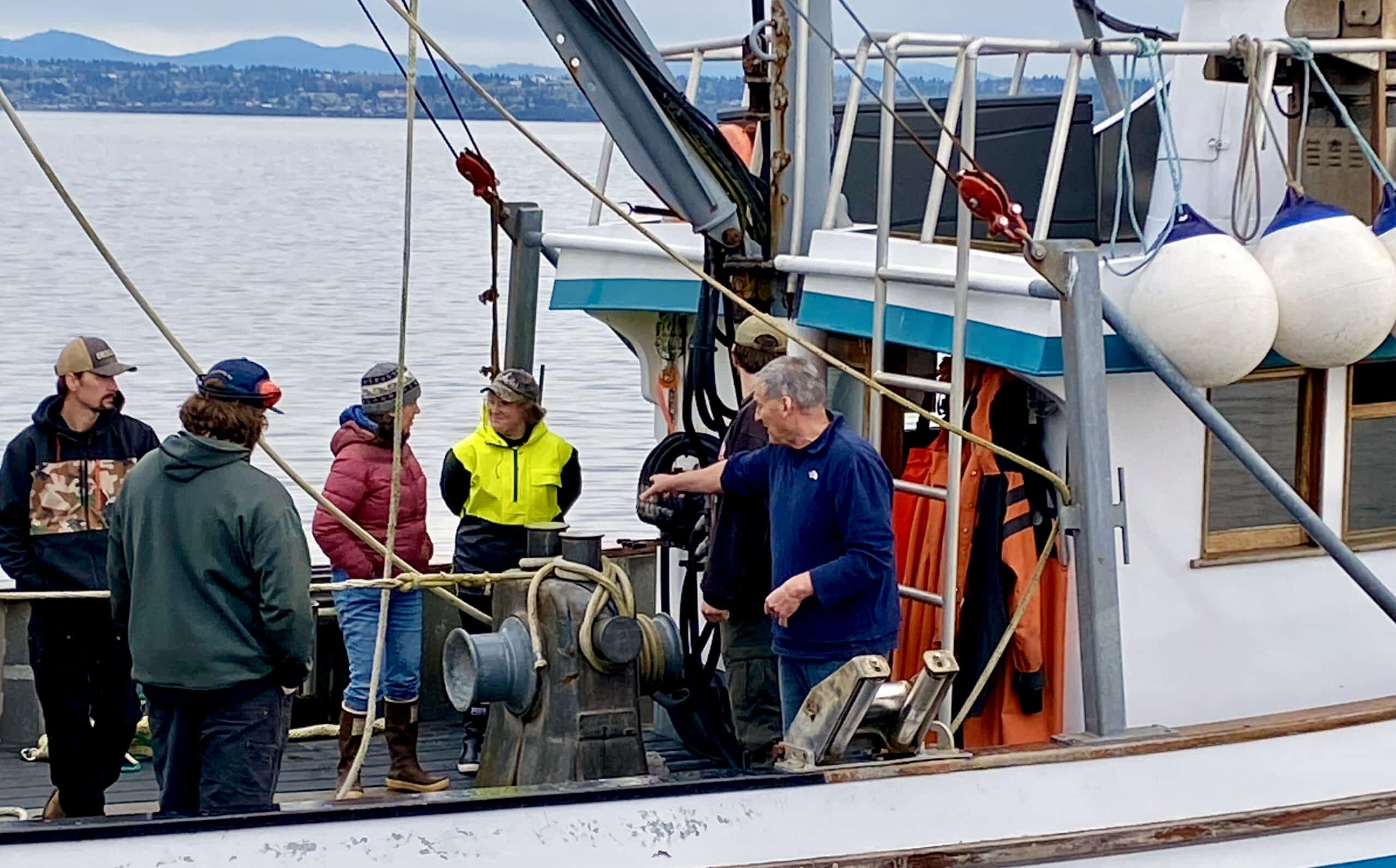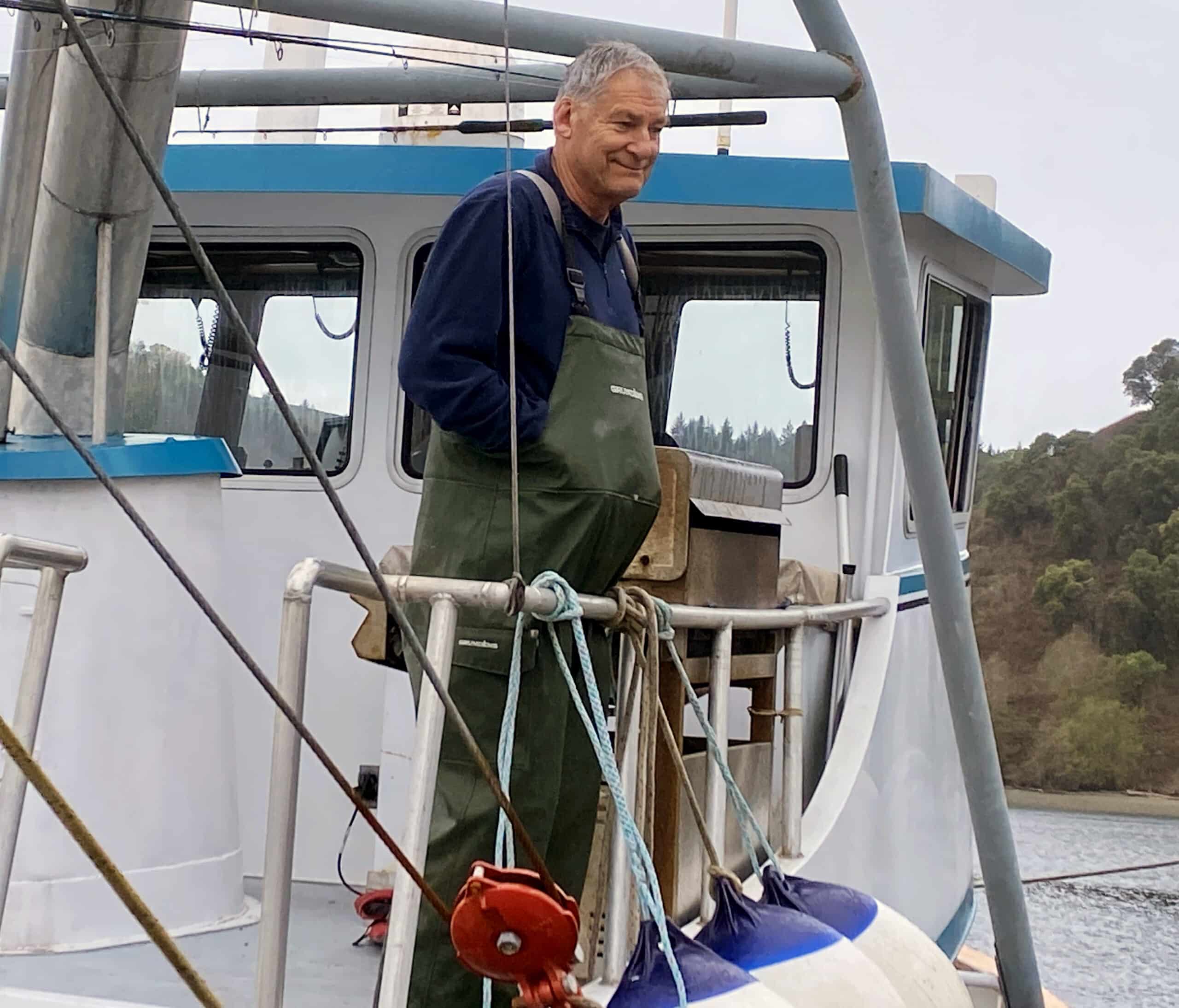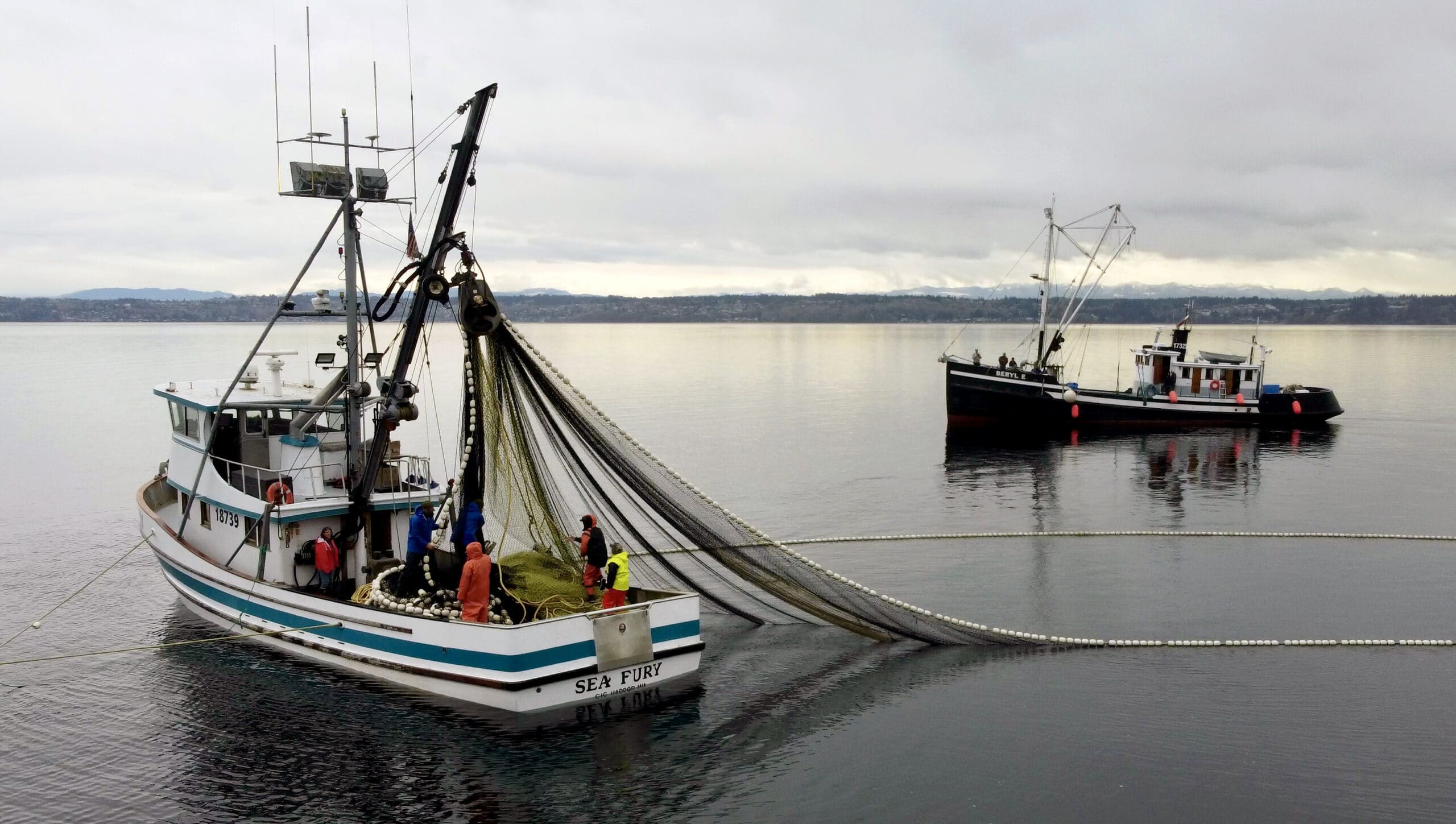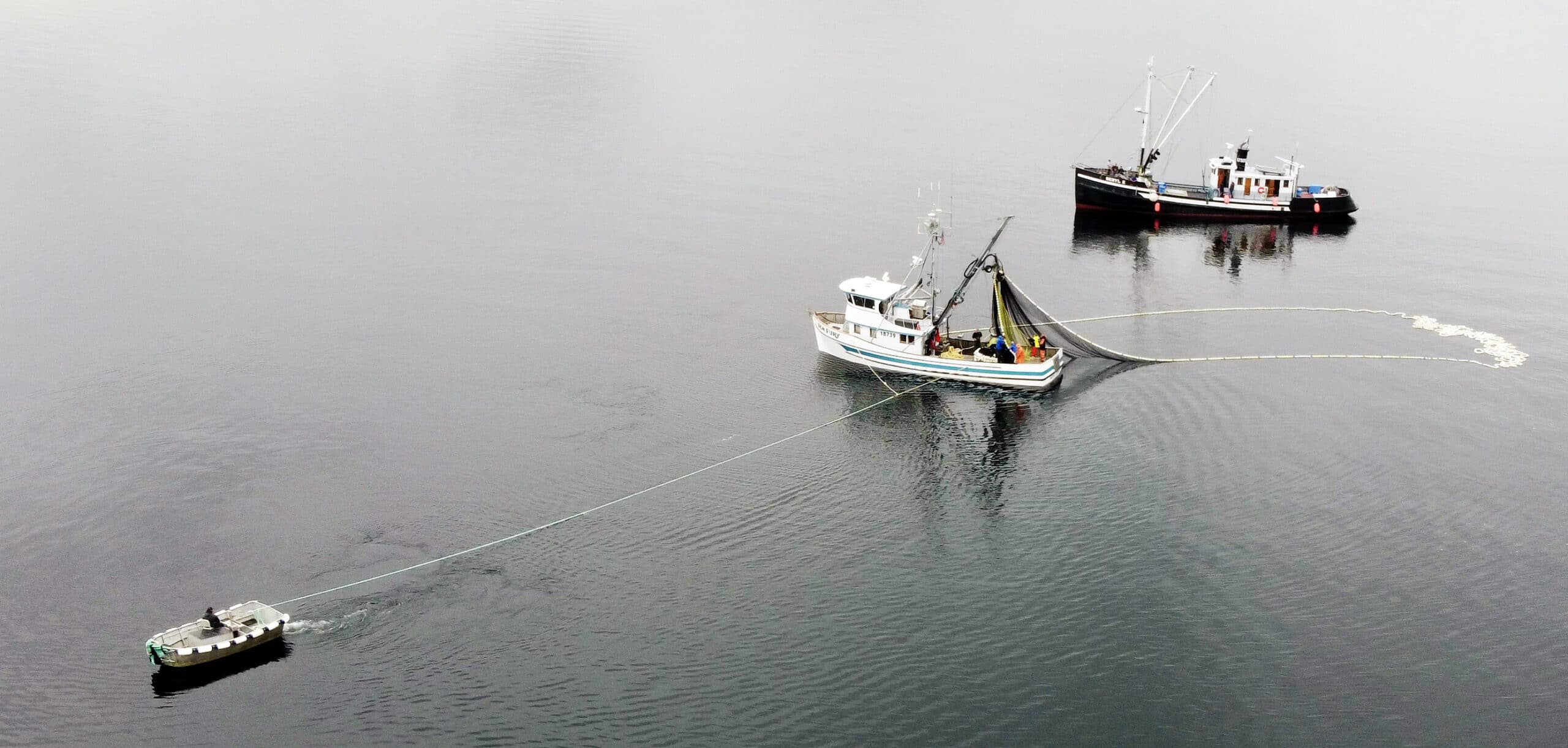Business Community Education
In the Margins | Crew School provides a reality sea trial for commercial fishing wanabees
During decades as a desk-jockey, I moved words and numbers around on various glowing screens. I often longed for work beyond the confines of the cubicle. You know — honest, hard work that allows for physical achievements, hand-made results, and liberal use of Advil.
Community Sponsor
Community stories are made possible in part by Peninsula Light Co, a proud sponsor of Gig Harbor Now.
After weekends of amateur landscaping, crude carpentry, or bloody-knuckled attempts at various car and boat rehab projects, I would retreat to my desk with a large coffee and multiple Band-Aids applied to my vocationally bruised ego. Come Monday, I would swap my blue-collar Carhartts for another white-collar commute to the safer confines of the computer screen. And more Advil.
In this age of Tik Tok addictions and six-figure college tuition costs, I am not alone in feeling a latent urge for anti-desk work. For 2023, the National Student Clearinghouse reported a 16 percent annual increase in vocational training programs at community colleges nationwide. The Wall Street Journal recently highlighted a software company’s survey noting that 75 percent of young adults would be interested in voc-tech schools that offered paid, on-the-job training.
Clearly, some Gen Z types are sidestepping the cubicle for a turn with the nail gun, welding torch or dental hygienist toothpick.
In Washington state, total enrollment in voc-tech education (about 273,051 students in 2022-23) remains about 25 percent lower than before the COVID pandemic (362,862 students in 2018-19). But the voc-tech enrollment numbers may fully rebound once we see numbers from the 2023-24 school year, according to the State Board for Community and Technical Colleges.
Reeling in a few good men … and women
Along Gig Harbor’s waterfront, this vocational trend is gently materializing in the form of a newly organized Crew School for potential commercial fishermen — and women. During March, seven people completed this hands-on training program that essentially offers a reality-based test drive for those interested in commercial fishing aboard a 58-foot purse seiner.

Crew Class culminates with all hands on deck aboard the Sea Fury. Photo by Trevor Nordeen
It’s the second such training program offered here during the past three years. Both the instructors and students are hopeful it will continue.
The six-day program cost enrollees a mere $100 fee, thanks to grant funding and administrative support through the Gig Harbor BoatShop and the UW’s Washington Sea Grant program. LFS Inc., a generous Bellingham-based supplier of marine and fishing equipment, helped outfit the program with gear.
Commercial fisherman turned instructor
Lifelong local fisherman and purse seine captain Gregg Lovrovich is program lead and creator of the crew-in-training curriculum. He coaches rookies through knot skills, gear maintenance, net setting/handling, safety and survival skills, not to mention the realities of living for months in a 58-foot space with 3-4 crew members who get all too familiar with one another.
The goal is to equip aspiring crew members with a basic set of skills and a sober understanding of what it takes to work aboard a commercial fishing boat or tender. The class scrubs away any romantic notions of the work in favor of a practical understanding of the basics.

Gig Harbor commercial fisherman Gregg Lovrovich leads the program as skipper and coach. Photo by Trevor Nordeen
Crew School also provides Coast Guard-approved certification for sea safety, survival, and first-aid skills — not trivial teachings when you’re hauling seine nets onto a slippery deck in the choppy seas of offshore Alaska.
“These days we don’t get as many people walking the docks looking for crew work anymore,” said Gregg. “Our goal is to give these people a real idea of the work before they get on a boat.”
Gregg relishes his role as seaworthiness instructor. “I enjoy it. Until you get them in a real situation on the water, it’s hard to tell how they will handle it.”
Now 70, he started commercial fishing out of Gig Harbor at age 12 with his father aboard the Sea Gem. For every summer except two, he worked aboard a fishing boat. Now he runs the Sea Fury, one of a handful of purse seiners still home-based in Gig Harbor.
Equal parts captain and coach
In his role as skipper, Gregg is equal parts captain and coach, and not by accident. A couple years after graduating from high school, he landed a basketball scholarship at Pacific Lutheran University and earned a teaching degree. Inevitably, he soon returned to the docks.
“When you’re on a boat as skipper, you’re always teaching and coaching,” said Gregg.
Sarah Fisken, a veteran of the Washington Sea Grant program and a board member at the non-profit Gig Harbor BoatShop, helped launch the concept of Crew School when she met Gregg. The pair worked with the BoatShop’s founding director, Guy Hoppen, to troll for enough funding to make it happen.
“I don’t think Sarah will let me not do this,” said Gregg with a chuckle.
After being married to a commercial fisherman and working nine seasons on a purse seiner out of Seattle, Sarah immediately recognized a good instructional skipper when she met Gregg. In her youth, she was one of only six women in all of Seattle’s commercial fishing fleet. Now she’s trying to give others an entry into the demanding industry.
“We came up with the idea as a way to give people a taste of the real experience before they get on a boat,” she said. “In my opinion, when someone signs onto a boat, they should be able to stick it out for the season. I hope this class will help.”

The Sea Fury, a 58-foot purse seine trawler, hauls a practice net set during the class. Photo by Trevor Nordeen
Grads in the class of 2024
Aubri Rollins, a 34-year-old marina worker from Quilcene in Jefferson County, said the latest Crew School helped her to decide whether commercial fishing might be an attainable option for future work. Having operated a crane on Hama Hama Company’s oyster barge, she wanted to test her skills and enthusiasm on a bigger commercial fishing boat.
“This is just a slice of the experience, but you get to see everything involved in working out on the water. That’s special,” she said. “When I left the boat (on the final day of class), it really got me motivated. I think it’s something I have to do, someday. Now I at least have a clue.”
Another Crew School graduate, Charles Lawrence, 33, is a member of the Suquamish Tribe and a native of Suquamish, just east of Poulsbo. The combination of his tribe’s Puget Sound fishing rights and his own lifelong experience as a local fisherman led him to take the class when he learned about it at a job fair organized by tribal leaders.
“It was everything I was hoping for, and more,” he said. “The class was awesome. The more experience I can get on the water, the better.”
Asked whether Alaska fishing might be in his future, Charles said he has family responsibilities to weigh in making that decision. But he believes the class will help him be more successful with whatever options emerge in his fishing future.
“It’s in my blood, and I’m always ready to learn more,” he said.
Charting a course to future classes?
After two successful Crew School sessions (2022 and 2024), it remains to be seen whether the program can stay afloat for the long haul. Gregg and Sarah are hopeful that the combination of future education grants, potential support from local port authorities, and positive talk on the docks will help buoy the program.

A full demonstration of purse-seine fishing involves the trawler, a small power skiff, and a nearby tender to receive the catch. Photo by Trevor Nordeen
At the BoatShop, Guy Hoppen agrees. “We’d like to do it again. It’s a program that fits our mission well. We want to help facilitate the working waterfront by connecting fishermen with crew, and crew with fishermen.”
Regardless of what’s next for Gig Harbor’s Crew School, it’s a good bet that a few good men and women will be found occasionally walking the docks of Gig Harbor in search of a job outside of the Monday morning office cubicle.
For those who listen, the siren calls of finding work out on the water can be a relentless and powerful force. And, thankfully, Advil comes in convenient crew-sized bottles.


